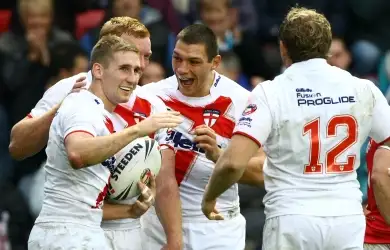This isn’t how to fix rugby league

Over the past week LoveRugbyLeague.com has published three blogs by Chris Caulfield entitled “How to fix rugby league”, with the tagline “What the RFL must learn from other competitions around the world if it wants to save Rugby League in Europe.” Over the course of these three blogs Caulfield sets out radical changes to the way rugby league is run in the UK and across Europe in the hope of turning it from a backward, geographically limited, small-scale game into a global sporting powerhouse.
It’s tricky to assess any of Caulfield’s suggestions in isolation because together they form a coherent whole, a totally different vision for Super League Europe and what would become its feeder leagues. Besides which, a thorough response to the three blogs would require another three blogs. In this blog I hope to make a few general observations.
The overarching problem with these kinds of proposals is their speculative, hypothetical nature. Like threads on internet forums that discuss proposed new clubs or competitions or reorganisation or existing ones, the suggestions made bear little relation to reality. For example, Caulfield suggests new clubs in Scotland, Ireland and Biarritz to be placed in Super League, but does not detail how or why these clubs would be suitable for Super League, or even how they would get going in the first. Anyone can scribble down the names of which cities or regions should have a Super League club, but it’s really just playing make-believe rather than any serious thinking.
Another, related, problem occurs when whoever making these suggestions is over-familiar with American sports leagues and franchises. Any suggestions made will just be copied wholesale from whichever US sport the writer happens to prefer, without any consideration of context or culture. Caulfield borrows from a number. For instance, in Part 3 of he makes three major suggestions: shared central revenue, just like Major League Baseball; a draft system, just like the National Football League; and joint league ownership rather than clubs having individual owners, just like Major League Soccer.
In Part 1 the proposed league structure is unveiled, and – surprise, surprise – the new Super League is going to be arranged into conferences and leagues, just like the NFL. These are arranged at random, with seemingly no thought given either to geography or to the teams’ playing strength. One group consists of Wigan, Saints, Warrington and Widnes (poor Widnes!), while another consists of Barrow, Featherstone, Halifax and Whitehaven. The difference in playing strength is so severe that it isn’t even funny. But that’s not a problem it seems: “Major League Baseball has uneven divisions, and leagues, and that seems to be doing OK”.
Caulfield reassures clubs that would “whinge” about lost revenue due to a shorter fixture list by arguing: “Does the NFL suffer from each team only having eight home fixtures a season? No. Is the NFL the world’s most successful league? Yes.” This seems like specious reasoning to me.
Many of these suggestions have just been thrown out there, for no better reason than that’s the way the NFL works. Teams will be ranked on a win/loss record rather than by points; a golden-point system will “confine draws to the history books”; the Challenge Cup “should be scrapped” because “let’s face it, it’s only the spectacle of the final that’s keeping it going” (a final that is the biggest game in domestic rugby league, by the way). How, just how, does any of this “fix rugby league”?
The argument we’re being presented with is essentially this: American leagues and franchises are successful, and we will only be successful if we copy every single thing about them. This takes no account of any differences or variables whatsoever. It ignores that, for example, the English Premier League is remarkably successful without abandoning draws, dividing into conferences, or abolishing promotion and relegation if it comes to that (and surely the Premier League is a more likely model, seeing as it appeals to the same UK audience to which we must appeal).
There’s nothing wrong with taking ideas from more successful sports or competitions, whether it’s the NFL, the NRL or the Premier League. But when it’s done unquestioningly and uncritically like this it creates far more problems than it solves. Far from innovative thinking, it just suggests and NFL fan that wants to make rugby league more like his favourite sport.
Keep Your Eye on NFL … I mean, Rugby League